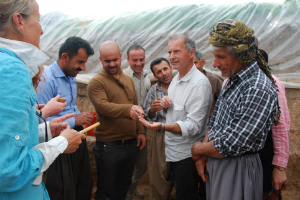Iraq's heritage sites win new advocate against Daesh destruction
Release Date 14 June 2016

Daesh's ongoing destruction of Iraq's heritage sites is top of the agenda for RASHID International's new President, Professor Roger Matthews.
The University of Reading archaeologist was elected as President of Research Assessment and Safeguarding the Heritage of Iraq in Danger (RASHID) International at a recent meeting in Munich.
In his new role, Professor Matthews has met with the Iraqi ambassador and cultural attaché in London, and he has engaged with the United Nations High Commission for Human Rights to discuss how RASHID International can help to prevent the destruction of heritage sites in Iraq.
Professor Matthews said: "Iraq has historically been a diverse, multi-ethnic, multi-religious society, rich in its wealth of cultural heritage.
"Some of the most important archaeological and historical sites in the world are in Iraq. In the past few years many of them have been severely damaged or are threatened with imminent harm. We cannot stand by and let ignorance and prejudice succeed over tolerance and mutual respect. It is time for heritage professionals across the world to unite and to bring our capabilities together for the benefit of Iraq."
Professor Matthews, who is the Head of the Department of Archaeology at the University of Reading, has co-authored and submitted a report to the UN Office of the High Commissioner for Human Rights, Special Rapporteur for Cultural Rights, Professor Karima Bennoune.
The assessment highlights the city of Mosul, detailing the destruction of Mosul's medieval monuments carried out by Daesh (also known as the Islamic State and ISIS) criminals who have occupied Iraq's second city since 2014.
RASHID has also offered its expertise to the UN in advising on future cultural heritage activities in Iraq.
Many of Iraq's archaeological sites are being deliberately targeted for destruction by terror groups. RASHID International collects and shares expert knowledge to provide substantive information on the destruction of culturally significant sites.
Professor Matthews added: "As a practising archaeologist and a long-term friend of Iraq, I am glad to have this opportunity to share knowledge and expertise with colleagues around the world to help Iraq.
"I especially look forward to ongoing discussions and programmes of activity with our Iraqi colleagues."
RASHID, meaning ‘rightly guided' in Arabic, is a network of expert scientists and professionals who work on the history and archaeology of the cultural heritage of ancient Mesopotamia, which roughly corresponds to modern-day Iraq, Syria and Kuwait, including regions along the Turkish-Syrian and Iran-Iraq borders. Iraq hosts thousands of monuments and archaeological sites of global significance, including some of the world's first cities and empires.
Professor Matthews was previously Director in Baghdad of the British School of Archaeology in Iraq (1988-1995), as well as Chairman of the British Institute for the Study of Iraq (2006-2012). He has published prolifically on ancient Iraq, including ‘The Early Prehistory of Mesopotamia', ‘The Archaeology of Mesopotamia: theories and approaches', and ‘Cities, Seals and Writing'. He currently co-directs, with Dr Wendy Matthews (also of the Department of Archaeology, University of Reading), the Central Zagros Archaeological Project, investigating the origins of farming villages in the Zagros Mountains and foothills of eastern Iraq and western Iran.
